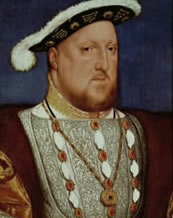Dr. Verena Theile, Assistant Professor

Department of English |
| Selected Bibliography for Henry VIII |
Baumann, Uwe, ed. Henry VIII in History, Historiography and Literature. Frankfurt: Peter Lang, 1992. Bloom, Harold. “The Late Romances: Henry VIII.” Shakespeare: The Invention of the Human. New York: Riverhead Books, 1998. 685-692. Bosman, Anston. “Seeing Tears: Truth and Sense in All Is True.” Shakespeare Quarterly 50.4 (1999): 459-76. top Carney, Jo Eldridge. “Queenship in Shakespeare's Henry VIII: The Issue of Issue.” Political Rhetoric, Power, and Renaissance Women. Eds. Carole Levin and Patricia A. Sullivan. Albany: State U of New York P, 1995. 188-202. Cook, Albert. “The Ordering Effect of Dramatized History: Shakespeare and Henry VIII.” Centennial Review 42.1 (1998): 5-28. top Glimp, David. “Staging Government: Shakespeare's Life of King Henry the Eighth and the Government of Generations.” Criticism: A Quarterly for Literature and the Arts 41.1 (1999): 41-65. top Healy, Thomas. “History of Judgement in Henry VIII.” Shakespeare’s Late Plays: New Readings. Eds. Jennifer Richards and James Knowles. Edinburgh, Scotland: Edinburgh UP, 1999. 158-75. Heinrich, Hans Peter. “Shakespeare's Henry VIII: A Parable of Mutability.” Henry VIII in History, Historiography and Literature. Ed. Uwe Baumann. Frankfurt: Peter Lang, 1992. 203-22. Hilberdink-Sakamoto, K. “‘O God's Will, Much Better She Ne'er Had Known Pomp’: The Making of Queen Anne in Shakespeare's Henry VIII.” Shakespeare Studies 37 (1999): 21-44. Hiscock, Andrew. “Sovereignty: Crises of Desire and Faith in The Winter's Tale and Henry VIII.” Cahiers Elisabéthains: Late Medieval and Renaissance Studies 52 (1997): 53-62. Hunt, Maurice. “Shakespeare's King Henry VIII and the Triumph of the Word.” English Studies: A Journal of English Language and Literature 75.3 (1994): 225-45. top Kezar, Dennis. “Law/Form/History: Shakespeare's Verdict in All Is True.” Modern Language Quarterly: A Journal of Literary History 63.1 (2002): 1-30. Kiefer, Frederick. “Time and Deities in the Late Plays.” Shakespeare's Visual Theatre: Staging the Personified Characters. Cambridge, England: Cambridge UP, 2003. Krantz, Susan E. “Audience Response to Henry VIII and Cultural Destabilization.” University of Dayton Review 22.1 (1993): 133-46. Kreps, Barbara.”When All Is True: Law, History and Problems of Knowledge in Henry VIII.” Shakespeare Survey: An Annual Survey of Shakespeare Studies and Production 52 (1999): 166-82. top Leahy, William. “‘You Cannot Show Me’: Two Tudor Coronation Processions, Shakespeare's King Henry VIII and the Staging of Anne Boleyn.” EnterText: An Interactive Interdisciplinary E-Journal for Cultural and Historical Studies and Creative Work 3.1 (2003): 132-44. Luis-Martínez, Zenón. “‘Maimed Narrations’: Shakespeare's Henry VIII and the Task of the Historian.” Explorations in Renaissance Culture 27.2 (2001): 205-43. top McMullan, Gordon. “‘Thou Hast Made Me Now a Man’: Reforming Man(ner)liness in Henry VIII.” Eds. Jennifer Richards and James Knowles. Shakespeare’s Late Plays: New Readings. Edinburgh, Scotland: Edinburgh UP, 1999. 40-56. Monta, Susannah Brietz. “‘Thou Fall'st a Blessed Martyr’: Shakespeare’s Henry VIII and the Polemics of Conscience.” English Literary Renaissance 30.2 (2000): 262-83. Mueller, Janel. “A Tudor Queen Finds Voice: Katherine Parr's Lamentation of a Sinner.” The Historical Renaissance: New Essays on Tudor and Stuart Literature and Culture. Eds. Heather Dubrow and Richard Strier. Chicago: U of Chicago P, 1988. 15-47. Müller, Wolfgang G. “Shakespeare's Last Image of Royalty: Henry VIII.” Ed. Uwe Baumann. Henry VIII in History, Historiography and Literature. Frankfurt: Peter Lang, 1992. 223-39. top Patterson, Annabel. “‘All Is True’: Negotiating the Past in Henry VIII.” Elizabethan Theater: Essays in Honor of S. Schoenbaum. Eds. R. B. Parker and S. P. Zitner. Newark: Associated UP, 1996. 147-66. top Rudnytsky, Peter L. “Henry VIII and the Deconstruction of History.” Shakespeare Survey: An Annual Survey of Shakespeare Studies and Production 43 (1991): 43-57. top Saccio, Peter. “Henry VIII: The Supreme Head.” Shakespeare’s English Kings: History, Chronicle, and Drama. Oxford: Oxford UP, 1977. 208-228. Slights, Camille Wells. “The Politics of Conscience in All Is True (or Henry VIII).” Shakespeare Survey: An Annual Survey of Shakespeare Studies and Production 43 (1991): 59-68. top Vanita, Ruth. “Mariological Memory in The Winter's Tale and Henry VIII.” SEL: Studies in English Literature, 1500-1900 40.2 (2000): 311-37. top Wegemer, Gerard B. “Henry VIII on Trial: Confronting Malice and Conscience in Shakespeare's All Is True.” Shakespeare’s Last Plays: Essays in Literature and Politics. Eds. Stephen W. Smith and Travis Curtright. Lanham, MD: Lexington, 2002. 73-90. top Yates, Frances A. Majesty and Magic in Shakespeare’s Last Plays: A New Approach to Cymbeline, Henry VIII, and The Tempest. Boulder: Shambhala, 1978. top |
Last updated November 2007 |